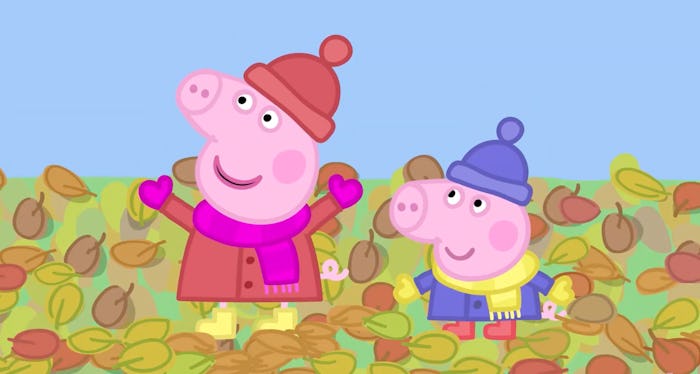Entertainment
'Peppa Pig' Was Just Banned In China For The Weirdest Reason
If you're a parent of young kids, chances are your children are in love with the British cartoon Peppa Pig. And, if your children are indeed in love with Peppa Pig, chances are you're still trying to understand exactly why that is. In all fairness, there are definitely far more annoying shows that are popular among little ones (looking at you, Caillou), but aside from the fact that Peppa has taught my children how to pronounce certain words with adorable British accents, I can't say I'm a huge fan. I definitely feel for parents in China today though, because China has banned Peppa Pig from Douyin, a popular video sharing platform, according to The Guardian, and now, countless moms and dads have just lost their secret weapon for actually getting a few minutes of peace and quiet (and perhaps even the chance to pee without anyone banging on the door).
Gripes about the muddy puddle-loving cartoon pig aside, banning Peppa Pig does seem like a pretty bold move. Sure she's not all that nice to her little brother, George, and there are a lot of not-so-kind quips about poor Daddy Pig's weight (maybe let's not teach young kids to fat-shame?), but all in all, it could be worse, right? Not according to state-run news outlet, Global Times, which claimed that the cartoon had "become an unexpected cultural icon of shehuiren subculture in China," a term that refers to "people who ... are usually poorly educated with no stable job," and are "unruly slackers roaming around and the antithesis of the young generation the Party tries to cultivate."
If that seems a bit confusing, well, it kind of is. Yet, it seems serious enough that "at least 30,000 clips" posted under the now-banned hashtag #PeppaPig have been removed from social media platform Douyin, according to Global Times. Part of the reason, it seems? Since Peppa Pig entered the Chinese market in 2015, it has become extremely popular — so much so, in fact, that Peppa Pig theme parks are actually scheduled to open in Beijing and Shanghai next year, according to The Guardian. Yet, Chinese children's love for the cartoon reportedly caused some concern among their parents, according to Global Times, due to Peppa's occasionally less-than-ideal behavior and commentary.
It sounds like that's not the only reason behind the ban, though. Despite being a children's show, Peppa Pig seems to have also become quite popular among teens and adults, and sporting Peppa Pig-themed tattoos (mostly fake, but sometimes real), candy dispenser watches, clothing, and stickers have become an actual fad, according to Sixth Tone. Add in the rise of counterfeit Peppa Pig merchandise, and according to the Chinese government, well, you've got a big problem.
A recent editorial in the state-run People’s Daily newspaper argued that the nation's love for all things Peppa is "not conducive to the healthy development of cultural industries," according to The New York Times, and that, "no matter how gangster Peppa Pig is, it cannot be allowed to destroy children's youth and go beyond the rules and the bottom line."
As strange as it may be to consider Peppa to be "gangster," it's not actually the first time that a generally-beloved children's character has been banned by Chinese censors. In July 2017, Winnie The Pooh was banned from Chinese social media platform Sina Weibo, after users had begun sharing posts that compared the honey-loving bear to Chinese President Xi Jinping.
Global Times reports that Peppa Pig is actually thought to be part of a long list of other banned content on Douyin, which includes things like "nudity, men dressing as women, displays of firearms, cult preachings and other controversial content." And though it might seem strange to see the popular children's cartoon lumped in with "cult preachings" and firearms, it's clear the censors are taking concerns about Peppa very seriously.
So, to all the Chinese parents who now have super upset children, my heart goes out to you. Though hopefully that at least means you won't have to deal with your kids going out of their way to jump in all the muddy puddles, and then begging for "homemade chocolate cake" once they get home.
Check out Romper's new video series, Bearing The Motherload, where disagreeing parents from different sides of an issue sit down with a mediator and talk about how to support (and not judge) each other’s parenting perspectives. New episodes air Mondays on Facebook.
